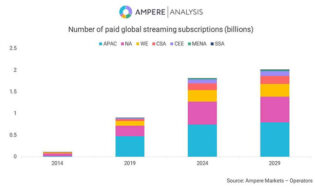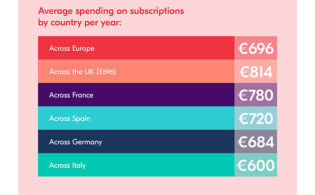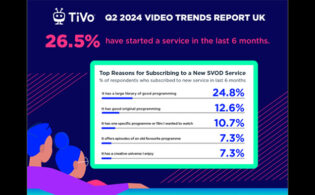The increasing importance of aggregators in the age of SVOD fatigue is among the key shifts set to reshape the media sector, according to the Deloitte Technology, Media & Telecommunications (TMT) 2025 Predictions report.
Per the report, the number of SVOD services per household is forecast to peak in 2025 at four in the U.S. and a little over two in Europe, with a decline going forward. SVOD revenues, however, could still rise with price hikes, further crackdowns on password sharing and improved bundling options.
Deloitte expects consolidation in the streaming sector with two to three standalone DTC SVOD players per market, complemented by aggregators like telcos, pay-TV platforms and tech platforms. “This shift may reduce costs and create a more sustainable streaming ecosystem,” Deloitte says.
Doug Van Dyke, telecommunications, media and entertainment sector leader at Deloitte, said: “The transition from a straightforward, user-friendly streaming model to a complex, fragmented landscape has reignited the demand for aggregated media and entertainment platforms. To successfully meet consumer expectations, the future of streaming should prioritize innovation and enhance the user experience. AI-powered platforms will be essential in personalizing content delivery and evolving from passive viewing to interactive experiences.”
The key theme of the report, however, is Gen AI, which Steve Fineberg, vice chair and technology sector leader at Deloitte, says is “poised to revolutionize society, and the decisions we make today will shape the trajectory of innovation, economic prosperity, and societal well-being for the future. Bridging the gap between the current state of GenAI and its future potential is important. Organizations should work to ensure that this powerful technology is harnessed to address global challenges, foster human ingenuity, and create a brighter future for generations to come.”
China Widener, vice chair and TMT industry leader at Deloitte, added: “AI represents the latest chapter in the ongoing story of technological progress, yet gender disparities continue to persist. From the early days of computing to the advent of modern AI, women have frequently been underrepresented in both the development and application of technology. This lack of diversity can impact innovation, limit the potential of technology to address societal challenges, and perpetuate systemic inequalities. To fully harness the benefits of AI and other technological advancements, organizations should strive for gender equality at every level. By fostering a diverse and equitable tech ecosystem, organizations can help ensure that AI is developed and deployed in a way that benefits everyone.”






